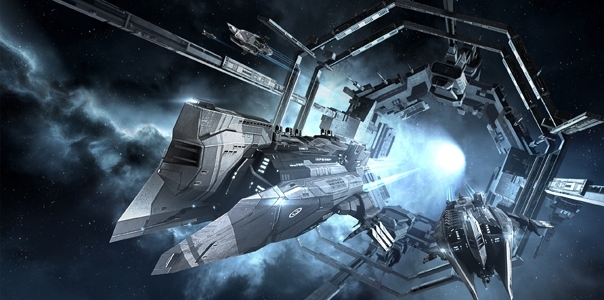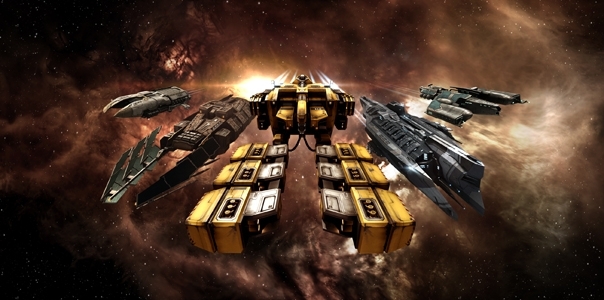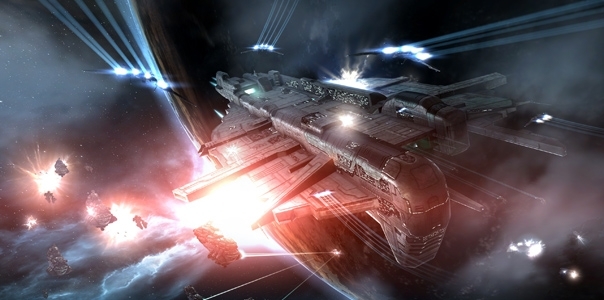12 Games of Christmas: EVE Online
In an exclusive interview, executive producer Jon Lander talks about what makes EVE Online successful, how expansions are built and what the future holds.

EVE Online is certainly unusual among MMOs. In the staggering ten years it’s been running, the spacefaring sandbox has consistently grown in popularity. Yet Icelandic developer CCP shows no signs of slowing down, releasing Retribution – the game’s 18th expansion, planning a 10th anniversary FanFest and launching shooter Dust 514 on PlayStation 3 later this year.
For executive producer Jon Lander, part of that long-lasting success comes down to the basic concept of the game he leads. “I really struggle calling EVE a game. Certainly I, and a lot of the original developers, and the developers we have now, we all think of this as a massively multiplayer virtual world.” He continued “When you approach it from that angle, you realize that the important things in the real world aren’t necessarily games. The things which make a world meaningful are generally social interactions, and the evolution of history which can then affect the actions of the present.”
As we spoke just after Christmas, Lander went on to explain why his team don’t want to be the focal point for EVE’s stories. “If you play a game, and you play the imagination of somebody else, you’re playing through a single player game. I used to play a lot of the Splinter Cell games, and then I was playing a story which had actually come out of a developer’s head. I wasn’t playing my story – I sort of had to imprint myself on that.”
“What we’ve done with EVE is we’ve said we’re not going to write the story for our players to play. We’re going to create a number of systems, we’re going to create an environment, we’re going to create a backdrop, within which our players will be the people who will create the content.” Lander felt that this went beyond the traditional view of a sandbox game, instead being a virtual world where players use tools to create the kind of game they want.
“We have a vague idea of how certain things will work. If you create a market then people are going to buy and sell things on it, that’s fairly obvious. But are people going to create certain market trade routes, how will that influence the distribution of trade hubs throughout the universe; those are all things which have organically happened. People have fought wars within EVE to protect those trade routes.”

Sometimes, bugs in those tools have unexpected results, with Lander citing an example from EVE’s original launch back in 2003. An unintended feature allowed players to mine ore into their cargo hold, and then jettison it into a nearby canister. Instead of having to pause mining and unload in a nearby space station, they could now pull in a friend to fly ore back and forth while they mined. Those ore canisters also became tempting targets for thieves and pirates, creating PvP.
 “The good and the bad side of that mechanic then caused people to start having really meaningful interactions with each other. I think when you have these systems, and people have the opportunity to have very meaningful social interaction, that’s when EVE really comes into its own. And I think that’s the key to what we’ve done, which is we’ve built the success of EVE on building a community of people who genuinely live in this world; the things that they do affect its history and affect its future, and all we do is build systems which throw people into contact with each other.”
“The good and the bad side of that mechanic then caused people to start having really meaningful interactions with each other. I think when you have these systems, and people have the opportunity to have very meaningful social interaction, that’s when EVE really comes into its own. And I think that’s the key to what we’ve done, which is we’ve built the success of EVE on building a community of people who genuinely live in this world; the things that they do affect its history and affect its future, and all we do is build systems which throw people into contact with each other.”
CCP isn’t the only one building new elements of EVE’s virtual world. Player led efforts, such as training group EVE University and PvP boot-camp Agony Unleashed are helping new players with life in the cold dark of space, in exchange for in-game currency. Lander himself believes that these groups are hugely important to the game’s continued success. “When I first started playing in 2005, I played it solo for about three or four months. I’d never been a big social gamer, I’d always played single player games, and I’d played a few MMOs but EVE was the first one. Funny how very small events end up massively altering your life. But I thought ‘Right, my subscription’s going to lapse in a few days, I’ll go on one of these training courses.’ I went and said ‘OK, I’ll get a headset and I’ll do some voice comms and I’ll work out what it is, and I’ll probably listen to these strange, crazy internet gamers.’ “
“And suddenly I realized there was a community here which massively opened the game out. EVE was never designed to be a single player game. From day one it was always about trying to find ways for people to cooperate or to actively disrupt other people. It was about some form of social interaction. And I’m still playing to this day, purely as a result of meeting other players.” Some of those have since become close personal friends, with Lander adding “Those sorts of bonds, those social connections, really can traverse both the virtual and the real world, to the point where actually, I think a lot of people stay with EVE because of those people that they’ve met, be it in real life or be it purely in the virtual world.”

With the sandbox-like toolset bringing such strong social interaction, I asked Lander if other online games should become more EVE-like. He was quick to disagree, instead suggesting that EVE might start adding more single-player content in specific areas. “One thing which has maybe been to EVE’s detriment over the years is how hard it is to get in and stay in the game. What we find is, once people get to a certain point, they generally stay with the game for years, but many people don’t get to that point. They drop out. And I think part of the reason for that is the single player experience is so barren.”
 “In an online game where there’s a huge amount of anonymity, and especially with the reputation EVE has got where everybody is out to get you, I think you need a certain amount of single player leading people in, so they actually want to go and make these social connections. It’s certainly one of the things that we’re beginning to look at within EVE now, which is how do we smooth out that learning cliff, how do we make it less threatening, how do we make it easier for a new person to get into the game, and that will involve a certain amount of single player content. But I think the longevity of EVE is very much down to the fact that there are very few players in EVE who genuinely have a solo player experience.”
“In an online game where there’s a huge amount of anonymity, and especially with the reputation EVE has got where everybody is out to get you, I think you need a certain amount of single player leading people in, so they actually want to go and make these social connections. It’s certainly one of the things that we’re beginning to look at within EVE now, which is how do we smooth out that learning cliff, how do we make it less threatening, how do we make it easier for a new person to get into the game, and that will involve a certain amount of single player content. But I think the longevity of EVE is very much down to the fact that there are very few players in EVE who genuinely have a solo player experience.”
Is the reputation that EVE has earned a fair one? Lander doesn’t seem to think so. “EVE’s got a wonderful reputation, because a lot of the press that we get about the stories in game is typically when somebody’s done something bad. In fact, just look at any of the news on TV in any country, and it’s usually about disasters, and robberies, and murders and whatnot. And I think when you’re reporting on a virtual world, you’re probably going to focus on those things as well. Things like EVE University, a group of people who are paying CCP their subscription to play the game, the way they get fun out of this experience is by helping new players learn what the game is about. They don’t make a huge amount of noise.”
Even the notorious Goonswarm came in for praise. “[They] originally came in and brought their entire community from SomethingAwful, and basically just ran around having a huge amount of fun, getting blown out of the sky and not getting too upset about it. But most of what you hear about Goonswarm is not how they brought a huge number of players to the game and had a huge amount of fun and added a lot of content, not just for their own community but for others. You hear about how they scammed people.”
Next Up: Building Expansions, Entering China and FanFest on Page 2 ->




